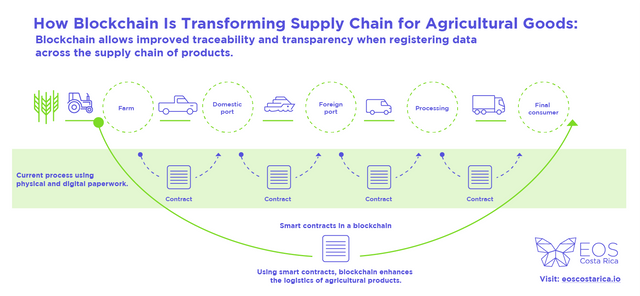The Benefits of Deploying Blockchain Technology in Agriculture
Agriculture represents a significant source of employment and contribution to the economy of many countries around the globe. In 2030, the demand for food is expected to increase by 35%. This would require more efficient production systems to meet the needs of a growing population. The sector has experienced many changes with the rise of new technologies, and there is still a lot of opportunities to implement innovative solutions that go hand in hand with Industry 4.0.
For instance, blockchain technology. A blockchain is a large record of data that resembles a ledger that is shared among various users or nodes to securely register immutable transactions.
There are numerous use cases of this technology for its traceability and cost-efficiency capabilities. Over the years, many blockchain platforms have been developed and the protocol known as EOSIO has stood up because of its versatility and smart contracts execution capacity.
Some Possible Outcomes When Deploying Blockchain in Agriculture
1. It increases efficiency and traceability across the production chain:
Blockchain may solve information management problems in real-time across the production and supply chains of agricultural products. As previously mentioned, a blockchain provides an immutable and transparent registry of data. This registry represents a more efficient, seamless, and easy-to-use alternative to monitor information of the process and improve traceability across the supply chain.
Also, deploying this technology allows keeping precise records of information about the origin of the products, production date, and details about the producer. Blockchain increases security and trustiness among parties, which may become valuable when exporting products. For example, blockchain can rapidly help when recalling products in the case of a sanitary alert or to maintain traceability of the use of agrochemicals or fertilizers.
Italian food company Barilla is implementing blockchain to guarantee the origin, quality of the product and raw materials, and to certify the freshness of basil used in some of their products. Additionally, Walmart started implementing blockchain to digitize the traceability of perishable goods across the supply chain, thus helping sanitary authorities to react faster in case of identifying poisoning in a batch of products.

2. It improves production processes:
Technology has a positive impact on farming efficiency and productivity. For example, data gathered by sensors can be stored in a blockchain and used for specific actions. Measurable data include the temperature of the soil, the use of agrochemicals or fertilizer, water availability, and weather conditions
By having a clearer picture of usually unpredictable weather conditions, farmers can be prepared with anticipation to help them increase the survival of crops, improve pricing tactics, and therefore influence employment in the sector.
3. It increases transparency for final consumers:
There is a growing demand for consumers to know the origin of the products they buy. This has opened a window of opportunity for blockchain technology. In a highly competitive field such as farming commodities (coffee, rice, beans), final consumers value access to information about the production process, to whom they are buying, and the overall quality of the product.
For instance, supermarket chain Carrefour and Nestlé have partnered to implement blockchain into a purée brand in France. By using their smartphone, consumers are able to scan a QR code in the packaging and access to traceability information from production to the store, including the date of production, quality control parameters, storage times, and location of warehouses. Carrefour also started implementing blockchain for other products such as meat, milk, and fruits.
4. It improves the management of farm finances:
Managing financial, accounting, and administrative information may be challenging for the agricultural sector. This may also carry difficulties when defining competitive prices for the products. By implementing blockchain, the management process of this data can be more transparent and accessible, as well as efficient and in real-time. The capabilities of blockchain to keep immutable registries may become an ally of farmers.
Contact us for more information.
EOS Costa Rica develops blockchain-based solutions for any type of organization and provides resources to the EOSIO infrastructure. Let’s talk about how you can implement this technology into your agricultural business. Follow us on social media:
- Website: https://eoscostarica.io/home/
- Twitter: https://twitter.com/eoscostarica
- Telegram: https://t.me/eoscr
- Facebook: https://www.facebook.com/costaricaeos/
- LinkedIn: https://www.linkedin.com/company/eoscostarica/
- Medium: https://medium.com/@eoscostarica